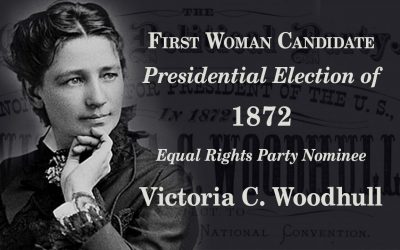Let us not forget the women who paved the way.
When, if, and as Hillary Rodham Clinton secures the nomination of the Democratic Party at its national convention in July, she will become the thirtieth woman nominated for President by a national party. It is both baffling and disappointing that major newspapers and media outlets have claimed she will be the first.
When it happens, this will be a major historical event, as Secretary Clinton will be the first woman ever selected by one of the major parties of the two party system, and will also be the first viable woman candidate to potentially win the Presidency. This is exciting, especially for those who study women’s history and rights, feminism, humanism, and social progress.
Peta Lindsey — 2012
I hope that Candidate Clinton will actively acknowledge the women who paved the way for her imminent, unprecedented accomplishments. The list starts all the way back in 1872, half a century before women could vote, when Victoria Claflin Woodhull (1838 – 1927) secured the nomination as the candidate of the American Equal Rights party. Her running mate was none other than the famous freed slave, abolitionist, orator, and statesman, Frederick Douglass.
Victoria along with her sister, Tennessee Celeste Claflin, were the first women to open a brokerage firm on Wall Street (1870), and publish a women owned newspaper (1871). Victoria was cruelly punished for her audacity by being portrayed as Mrs. Satan in the press, ridiculed by all the major newspapers, and arrested on false charges to spend election day and night in the notorious Ludlow Street jail nicknamed ‘The Dungeons.’ Both sisters lived long lives manifesting a prodigious list of firsts for women accomplishments. They both advised Emmaline Pankhurst and helped position the British Suffragette movement she founded.
The following was Victoria’s political platform (surprisingly similar to todays issues):
- Full legal and social rights for women
- Equal pay for equal work
- Regulation of and splitting up monopolies
- End political corruption by purchasing influences
- Eight-hour workday with living wages
- Universal healthcare
- Establish (increase) direct taxation of the wealthiest
- Abolition of the death penalty
- Welfare and vocational training for the poor
- The opportunity to elect the first woman President
Belva Ann Lockwood (1830 – 1917) became the second woman to run for President in both 1884 and 1888, nominated by the National Equal Rights Party (the antecedent to Victoria’s Equal Rights Party). After Columbia Law School turned her down, as they deemed the presence of a woman to be too distracting, Belva graduated National University Law School (known today as the George Washington University Law School among several other women. National University refused to award the women a diploma, so they could not take the District of Columbia bar exam to become practicing attorneys.
At age forty-three Belva Ann Lockwood petitioned the President of the United States, Ulysses S. Grant, arguing that as President of the Union, he was the ex-officio President of the National University Law School. Weeks after her petition, she received her diploma and went on to pass the bar and practice law in spite of repeated prejudice from judges decrying her appearance in their courtrooms. She constantly faced the argument that God Himself had determined that women were not equal to men and never could be.
Supreme Court justices used her marriage as grounds for denying her the right to appear because as a married woman she was legally subordinate to her husband. Lockwood wrote anti-discrimination legislation to give women the same rights to practice law in Federal courts. She became the first woman to argue a case before the Supreme Court and a year later sponsored Samuel R. Lowrey as the fifth black attorney admitted to the Supreme Court Bar and the first black attorney to argue a case before the Court.
This is the full list of the twenty-nine women who achieved the nomination of their national parties in thirty-six Presidential elections:
Victoria Claflin Woodhull — 1872
Belva Ann Lockwood — 1884, 1888
Gracie Allen — 1940
Ellen W. Linea Jensen — 1952
Mary Kennery — 1952
Agnes Waters — 1952
Charlene Mitchell (1st African American) — 1968
Linda Jenness — 1972
Evelyn Reed — 1972
Margaret Wright — 1976
Ellen McCormick — 1980
Maureen Smith — 1980
Deidre Griswold — 1980
Sonia Johnson — 1984
Gravielle Holmes — 1984
Lenora Fulani — 1988, 1992
Willa Kenoyer — 1998
Helen Halyard — 1992
Isabella Masters — 1992, 1996
Gloria La Riva — 1992, 2008
Monica Moorehead — 1996, 2000
Marsha Feinland — 1996
Mary Call Hollis — 1996
Diane Beall Templin — 1996, 2004. 2008
Cathy Gordon Brown — 2000
Cynthia McKinney — 2008
Jill Stein — 2012
Roseann Barr — 2012
Let us be aware of and acknowledge ALL of the women who brought us to where we are today.
Neal Katz is author of the five-time, International award winning historical novel, OUTRAGEOUS, The Victoria Woodhull Saga, Volume 1: Rise To Riches, and the soon to be released Volume 2, SCANDALOUS: Fame, Infamy, and Paradise Lost, which covers the 1872 election and aftermath. www.thevictoriawoodhullsaga.com
Mr. Katz is also founder of the Conscientious Credit Funding Organization based on a renewed paradigm of monetary liquidity—credit funding. Visit www.ccfoglobal.org

